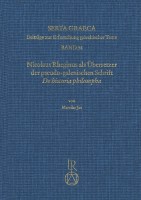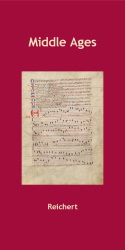Search
Nicolaus Rheginus als Übersetzer der pseudo-galenischen Schrift De historia philosopha
Ein Beitrag zur lateinischen Überlieferung des Corpus Galenicum
2018
17.0 x 24.0 cm, 512 p., 9 illustrations b/w, 9 Tafeln, cloth
ISBN: 9783954901951
17.0 x 24.0 cm, 512 p., 9 illustrations b/w, 9 Tafeln, cloth
118,00 €
ISBN: 9783954901951
Short Description
A closer examination of the tradition of ps.Galen’s Historia philosopha reveals that Diels underestimated Nicolaus of Rhegium’s Latin translation and its significance for editing the Historia philosopha. This translation preserves readings that are superior to those of the extant Greek manuscripts. From this it can be inferred that the lost Greek manuscript used by Nicolaus must be independent of the extant Greek manuscripts, because those readings match readings transmitted in the doxographical tradition of the Placita philosophorum, more precisely in the tradition of ps.Plutarch’s Placita philosophorum such as in the Arabic translation of the Placita philosophorum by Qusṭā ibn Lūqā or in Eusebius’ Praeparatio evangelica.Description
The pseudo-Galenic text De historia philosopha is a particularly useful one in that it can help us develop an idea about the quality of the Greek manuscripts Nicolaus Rheginus used for his translation of Galenic and pseudo-Galenic texts. This is because Nicolaus’ translation can be compared not only with the extant Greek manuscripts of the Historia philosopha in general but also with the Placita philosophorum by pseudo-Plutarch in particular and the extant excerpts of the latter, for example those in Eusebius’ Praeparatio Evangelica. For as an epitome of the Placita philosophorum the Historia philosopha belongs to the doxographical tradition as well as Stobaeus’ Eclogae physicae. The Placita philosophorum and the Eclogae physicae decline to the lost doxographical text Περὶ τῶν ἀρεσκόντων τοῖς φιλοσόφοις φυσικῶν δογμάτων ἐπιτομῆς by Aëtius. The affiliation of the Historia philosopha to this doxographical tradition therefore provides an independent and objective instrument of control in the assessment of readings preserved in Nicolaus’ translation. For all readings can be compared with the Greek text of the Placita philosophorum as transmitted by the extant byzantine manuscripts, by one of the excerpts, for example transmitted in Eusebius’ Praeparatio evangelica, or with Stobaeus᾽ Eclogae physicae. The doxographical tradition is therefore an independent and objective instrument of control, because contamination of Nicolaus’ translation with one of these texts can be excluded. There is no evidence in Nicolaus᾽ translation that he used a manuscript that contained one of the other texts. As well as Hieronymus Surianus, who printed Nicolaus’ translation in 1502 and which is the only extant source for his translation, given that no Latin manuscript of the Historia philosopha has been transmitted. A contribution to this independent tradition is given to the fact that the Placita philosophorum has been passed down in the text corpus of Plutarch, while the Historia philosopha as an epitome of this text has been passed down in the Galenic text corpus. This prevented the knowledge about the relationship between those two texts until the printed Greek edition of the Historia philosopha from 1525, where first signs about the knowledge about this relationship are obvious. The correlation of the Historia philosopha, the Placita, the Praeparatio evangelica and the Eclogae physicae was not known until the 16th century as well.Biographical Note
- geb. am 06.04.1985 in Berlin- Nach dem Studium der Klassischen Philologie mit dem Abschluss des Master of Arts an der Freien Universität Berlin Promotion an der Ludwig-Maximilians-Universität München und wissenschaftliche Mitarbeiterin am Lehrstuhl für Griechische Philologie bei Prof. Oliver Primavesi
- Forschungsschwerpunkt: Die doxographische Tradition des Aetius




 Preface
Preface

 Neuerscheinungen 2023/2024
Neuerscheinungen 2023/2024
 Gesamtverzeichnis 2023/2024
Gesamtverzeichnis 2023/2024
 Katalog Oriental Studies & Linguistics
Katalog Oriental Studies & Linguistics
 Mittelalter
Mittelalter
 Deutsche Inschriften
Deutsche Inschriften
 Musiktherapie
Musiktherapie
 Literaturen im Kontext
Literaturen im Kontext